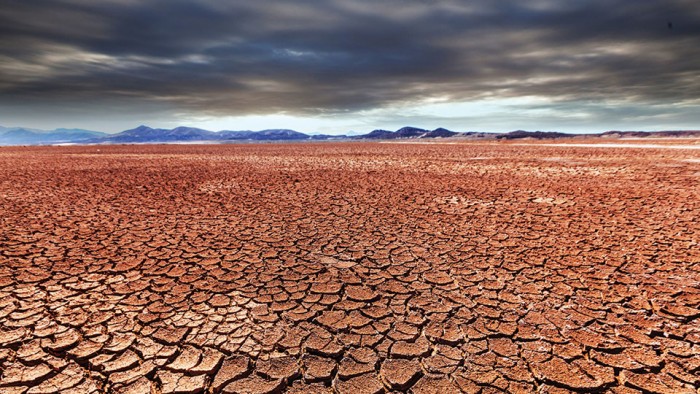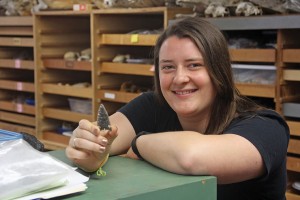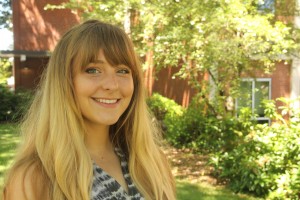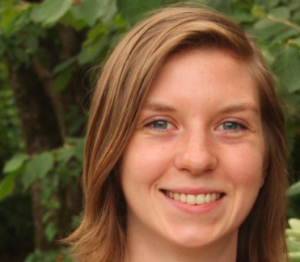Student Researchers Seek To Be The Change

There’s more than one way to study a human being.
A biologist, for example, would zero in on our physical bodies. A social scientist might concentrate on our relationships. A humanist? How we think, imagine, and communicate.
Complex subjects demand investigation and analysis from multiple angles.
So it is with climate change.
At the UO, undergraduates are grappling with climate change—its causes and effects—from numerous perspectives. What is the impact on animals, plants, rivers, and oceans? How are political systems and economies adapting? How do we express our fears and hopes in film, poetry, photography, essays, and even a new genre of fiction called cli-fi (climate fiction)?
When it comes to climate change, UO students are asking the questions that matter to them—and finding the answers themselves, through research projects conducted in libraries, in the field, and in laboratories. Supervised by faculty mentors, they explore what is known—and probe what is unknown—in their particular line of inquiry. Then, they investigate, analyze, synthesize, and draw their own conclusions. A research paper or thesis is often the result.
The opportunity to do meaningful research is a hallmark of the undergraduate experience at the UO. This annual fall edition of Cascade is devoted to showcasing a selection of students who are pursuing compelling research topics, either on their own or as part of a team. But these students are only a handful of the hundreds who are engaged in research across the arts and sciences.
UO students place high value on environmental awareness and sustainability, so it’s not surprising that the environmental studies major has quickly grown to be the sixth largest in CAS, with 500 students majoring in this field. But as the student profiles on the next three pages will show, students in virtually any major can pursue a research project that centers on climate change—from anthropology to geology, philosophy, biology, and even comparative literature.
Taken together, their work underscores the fact that any UO student can find a research topic and make it their own.
Miles Gordon, Class of 2016
Majors: Political science and philosophy
Mentor: Ron Mitchell, professor, political science
Economic Motivation: Gordon (right) wrote a research paper that compared three cities in South Africa, evaluating factors that might prompt a community to take action to address climate change. Among them: local knowledge of the problem, engaged citizenry, and clear economic benefits for taking action. He found the last factor to be most powerful in predicting a city’s adoption of policies responsive to climate change.
Power to the people: The three cities—Durban, George, and Khara Hais—voiced similar goals for environmentally friendly growth. But only Durban acted, by adopting green policies for development. Gordon attributed this to the city’s “strong civil society,” which prioritized the goal of becoming one of the world’s most livable cities, and pushed leaders to adopt progressive policies such as funding research on greenhouse-gas mitigation and food security.
The tragedy of the commons: In his analysis, Gordon likens climate change to “the tragedy of the commons”—the idea that individuals acting out of self-interest behave contrary to the best interests of the group by depleting a common resource. In the context of climate change, Gordon said, it refers to a country’s pursuit of economic goals at the expense of the environment.
The Mitchell doctrine: Working with political science professor Ron Mitchell, one of the nation’s leading scholars on international environmental policy, was an experience both “rough” and “beautiful,” Gordon said. Mitchell repeatedly poked and prodded Gordon to sharpen the focus and findings of his paper, and his critiques of each draft were to-the-point, to say the least. But the outcome was well worth it, Gordon said—“you crank out meaningful research with real-world applications. It’s empowering.”
Jordan Pratt, Class of 2015
Major: Anthropology
Mentor: Patrick O’Grady, staff archaeologist with the UO Museum of Natural and Cultural History
Warming Up: Pratt (right) studied more than 300 “projectile points,” a type of stone tool excavated from eastern Oregon. Her goal: to chart the movement of peoples reacting to a warming climate 7,500 years ago. Because the shape of a point can be specific to the period in which it was made, researchers use them to determine when and where humans have lived in certain areas.
Doubts and discoveries: Pratt experienced a moment of self-doubt when she discovered that the people in that region—the ancestors of the Burns Paiute tribe—had inhabited a particular area that researchers had thought to be too dry. “My research didn’t match the previous research and I thought, ‘Oh my gosh, (my research) is all wrong,’” Pratt said. “But then it was like, ‘No, that’s the point of research—you want to discover something.’ I learned not to be afraid of that.”
Back to the future: Although she focused on a period of climate change that occurred thousands of years ago, Pratt said there is a relevant takeaway for today: think globally, research locally. “You need to study localized regions and climates,” Pratt said. “Different communities experience different effects of climate change, so mitigation and adaptation in these areas is going to be different.”
Obsidian and charcoal: Archaeological field work is grueling—“It’s hot, you’re in a small hole, you’re kneeling in there with a hand trowel and looking for artifacts,” Pratt said. But it builds camaraderie, too. Pratt recalled a dig during which the team next to her kept unearthing beautiful obsidian projectile points, while her crew could produce only the leftovers from ancient fireplaces—charcoal. “We joked around with them,” Pratt said. “They were finding the shiny things but we were finding the things that can date the shiny things.”
Maria Schandl, Class of 2015
Major: Environmental science
Mentor: Tom Giesen, courtesy research assistant, Planning, Public Policy and Management
Into the dead zone: Hypoxic zones or “dead zones” are areas in the ocean without enough oxygen for most marine life to survive. Schandl (left) reviewed the literature on factors that contribute to hypoxia—e.g., snowmelt timing, stream flow, ocean acidification, water conditions, and fluctuating sea levels—in Hood Canal, an estuary of Puget Sound. From there she explored how climate change might affect these factors.
Temperature up, oxygen down: Schandl found that, as climate change pushes global temperatures up, the amount of oxygen in our oceans goes down, because warmer water holds less oxygen. Research indicates that by 2050, Puget Sound could experience an additional 30 days per year of “hypoxic conditions,” she reported in her thesis.
Data driven: Schandl cited about 40 reports for her investigation—she has her mentor, Tom Giesen, to thank for much of that. The two worked as “research partners,” she said, narrowing her topic to something manageable and then, together, diving into the existing data on an issue about which neither was an expert. “He sent me at least 20 papers on the topic,” Schandl said. “Tom was incredibly helpful and available.”
Livin’ on Red Bull and Sour Patch Kids: The research process taught Schandl something about herself—“I am a much more extreme procrastinator than I realized,” she said, laughing. As her project deadline approached, she recalled spending Memorial Day weekend in Knight Library, fueled by energy drinks and candy. “I ended up being awake for 60 hours or something ludicrous,” she said. “But I’m proud of myself for writing a thesis. I realized that I can accomplish anything I want as long as I will myself to do it.”
Chloe Talbert, Class of 2015
Majors: Computer and information science and political science
Mentor: Ron Mitchell, professor, political science
Less equipped to cope: In her research paper, Talbert (left) assessed how a country’s history—namely, whether it was colonized or not—affects its vulnerability to climate change ills such as economic losses or natural disasters. In a review of China, Japan, Mongolia, and Indonesia, she determined that the latter two countries, which had been settled by a colonial power, are less equipped to cope. As with many colonized countries, Mongolia and Indonesia are still developing and have unstable education, infrastructure, health care, and governance systems—this hurts their ability to, say, provide emergency services during a natural disaster. The finding could be useful for predicting which countries are most threatened by climate change moving forward, Talbert said.
Oil, the great equalizer: While previously colonized countries appeared less able to recoup the economic losses of climate change, Talbert found two exceptions—Algeria and Saudi Arabia. Noting their large oil reserves, Talbert argued that worsening climate change is correlated with increased use of oil—which means profits, not losses, for oil-producing countries.
A helping hand: Mitchell worked closely with Talbert, fine-tuning her premise and pointing her to the relevant data and literature for her project. They jointly analyzed the information and mapped out how to present her findings clearly. “I didn’t know quite how to research what I wanted to research,” Talbert said. “He helped me figure out how to analyze everything in an organized, scientific way.”
Political science meets computer science: Taking a deep dive into data analysis gave Talbert an appreciation for the similarities between her two majors. “Computer science is all about consequences—‘How does this decision affect what the consequences are?’” Talbert said. “Political science is the same—‘If this thing happens, what consequences will that have for who, and in what way?’ That kind of logical, analytical thought ought to be applied everywhere.”
Kendra Walters, Class of 2016
Mentor: Edward Davis, assistant professor, geological sciences
Mammals on the move: Walters (right) is studying how mammals are affected by climate change and the presence of humans. Using a database that records individual sightings of hundreds of thousands of specific mammals across the continental United States over the last century, she is creating a map that shows which areas of the country saw rising or falling diversity of mammals.
Number cruncher: Walters has to account for wrinkles in the data—some states reported far more mammals than others simply because more people submitted sightings of individual animals. California, for example, reported 84 times more mammal occurrences than Maine. Walters “standardizes” the results to project actual mammal numbers in states with underreported data.
Remember the pika: Managers of public lands are sure to sit up and take notice of Walters’ results as they plan the adjustment of conservation areas as climate change pushes mammals in new directions. Consider the American pika, a small, herbivorous mammal that lives in high-elevation areas: over the last century, the rate at which it has vanished from its typical habitat has jumped fivefold as the animal moves farther up the mountaintops, Walters said.
Partnering with a professor: Walters is working side by side with her mentor, Davis, who is considering the same question for a period millions of years ago. Their results will be combined to predict how mammals will be affected in the future. To get there, the two are teaching each other the complex coding language necessary to run sophisticated computer analyses. “We bought a book about (the coding language),” Walters said. “We would read a chapter a week and meet and go through the challenge exercises.”
Talking points: “I’ve learned how to write proposals, how to write concisely, and how to explain my science to someone who has no idea what I’m talking about,” Walters said. “(Climate change) is a very important conversation and I’m excited to be a part of it.”
—By Matt Cooper


 Twitter
Twitter Facebook
Facebook Forward
Forward



